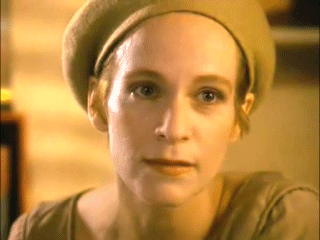Magical mini-moments in movies
10 January 2011
Sometimes it doesn’t matter whether a film succeeds as a whole, but whether a scene or mini-moment sticks in your mind long afterward. For  me it can be the quality of light shining on a woman’s hair that makes me marvel at the filmmaker’s craft. Or it might be the way the camera pans to take in a streetscape, or perhaps one of those mini-acting moments that’s so unexpected and delightful that it leaps out like 3D from an otherwise flat movie. That was my experience watching Terry Gilliam’s The Fisher King (1991) last night and marveling at what Amanda Plummer did with a small role. It was supposed to be Robin Williams’ movie: he was coming off big hits with Cadillac Man and Awakenings the previous year and was about to strike kid-movie gold with Hook. But Plummer stole it from him with her physical comedy as Lydia — the clumsiest, most un-selfconscious, prickly, and awkward woman in the history of film, a performance worthy of some kind of Chaplin/Keaton/Lloyd award. She achieved this nearly without dialogue.
me it can be the quality of light shining on a woman’s hair that makes me marvel at the filmmaker’s craft. Or it might be the way the camera pans to take in a streetscape, or perhaps one of those mini-acting moments that’s so unexpected and delightful that it leaps out like 3D from an otherwise flat movie. That was my experience watching Terry Gilliam’s The Fisher King (1991) last night and marveling at what Amanda Plummer did with a small role. It was supposed to be Robin Williams’ movie: he was coming off big hits with Cadillac Man and Awakenings the previous year and was about to strike kid-movie gold with Hook. But Plummer stole it from him with her physical comedy as Lydia — the clumsiest, most un-selfconscious, prickly, and awkward woman in the history of film, a performance worthy of some kind of Chaplin/Keaton/Lloyd award. She achieved this nearly without dialogue.
Plummer’s face is all angles, except for that strawberry bob of hair that falls into her face such that Gilliam nearly always shoots her from the left. There’s little perceptible makeup and her mouth, a hard line, is nearly always clamped shut in a way that conveys the grim resolution of a woman who knows she has few attractions. Yet it’s because of her awkwardness that Williams (driven mad by his wife’s death and who is now a visionary homeless man) has fallen in love after watching Plummer simply navigate, nearly unsuccessfully, her daily routine. Aided by Jeff Bridges and Mercedes Ruehl, he manages to go out for Chinese food with her one night. Note: you can cut out when Williams starts to sing — instead, watch Plummer’s command of the first 2½ minutes using nothing but that determined cock of her head and her badly-managed chopsticks:
If I had the capacity to excerpt films myself I’d show you my other favorite scene, which traces Plummer’s lunchtime routine through New York crowds, revolving doors, and collapsing stacks of books. Instead I’ll remind you of Gilliam’s magical scene at Grand Central Station, in which the smitten Williams sees Plummer and begins to imagine the throngs around them breaking into a waltz.
In the meantime, I wonder whether I might start the most eccentric list of all time: favorite mini-moments in film. Tell me your suggestions.




